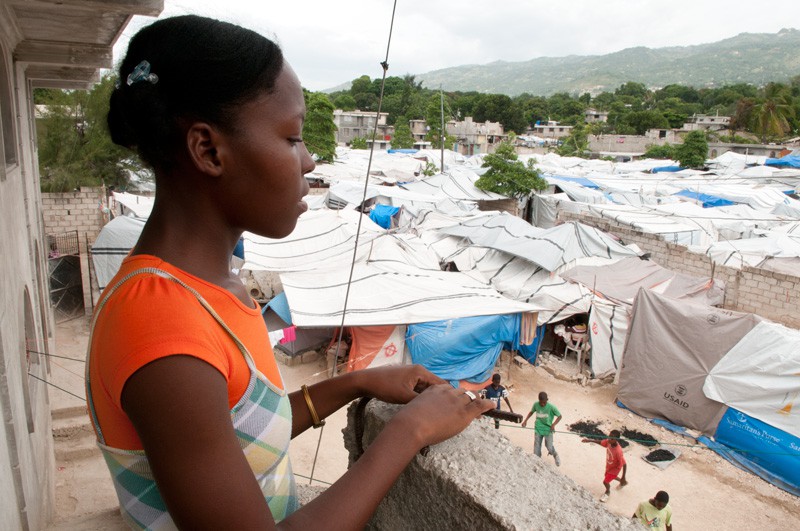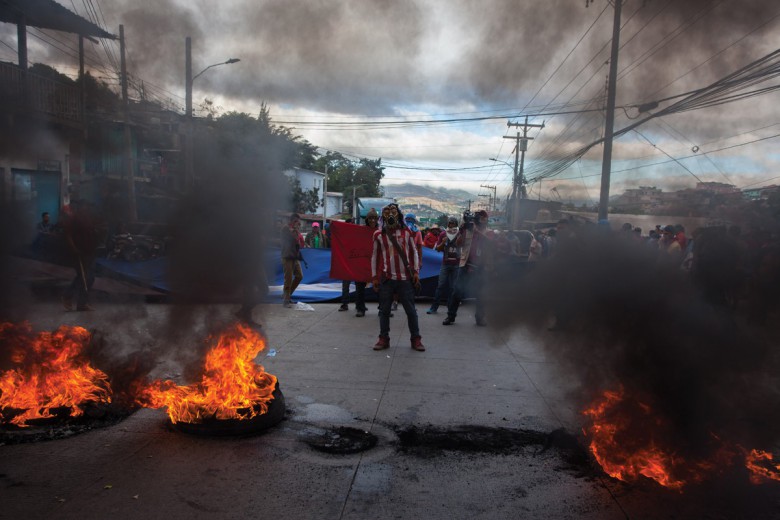
Across Canada, people reacted swiftly to the massive 2010 earthquake in Haiti. As reports of major devastation on the ground went global, thousands in Canada mobilized to support the Haitian people through grassroots benefit concerts, telethons, and community collections in a historic expression of international solidarity and one of the largest disaster relief fundraising efforts in Canadian history.
In Quebec, home to one of the largest Haitian diaspora communities in the world, the earthquake clearly touched a collective nerve. On the streets in Montreal, Haitians held vigils to express collective loss and solidarity. Those who lost or were actively searching for relatives worked tirelessly to mobilize support, holding countless community fundraisers, cultural events, and donation drives.
In addition to a diversity of grassroots initiatives to support Haiti in Quebec and across Canada, the Canadian Red Cross received historically unprecedented donations for Haiti. Public figures across Canadian society, from musicians to politicians and journalists, openly encouraged people to direct donations to the Red Cross as a way to concretely express their support.
On the first anniversary of the earthquake, the CBC reported that the Canadian Red Cross had collected almost $200 million in donations.
“In Haiti, the humanitarian assistance relief was the largest response by the Red Cross ever, including the Canadian Red Cross,” explains Jean-Philippe Tizi, the director of Haiti operations at the Canadian Red Cross, in an interview with Briarpatch. “We deployed a massive relief response in the area of emergency shelters, water, sanitation. We provided support in all these areas.”
Today, as tensions rise between the Haitian government and the hundreds of thousands who continue to live in makeshift displacement camps in Port-au-Prince, many in Haiti and around the world are questioning both the impact and transparency of major NGOs, and specifically the Red Cross.
Heightened scrutiny needed
A January 2012 press release by the Canadian Red Cross explains that projects in Haiti have shifted from “immediate life-saving assistance” toward “long-term recovery” work on the ground.
In response to critiques of Red Cross operations in Haiti – including concerns over reports that the Red Cross is now considering a hotel construction project in Port-au-Prince on a $10.5 million parcel of land purchased with donations for earthquake relief – Tizi outlines major projects and achievements without directly addressing difficult questions or shifting blame to the Haitian government.
“Beyond relief response, our work focused on providing safe shelter to people who lost their houses,” continues Tizi. “The Red Cross movement is the first provider of shelter solutions, in Jacmel and in Port-au-Prince, so we are targeting to provide 41,000 families with shelter… it could include repairs, cash for rent, or tents.”
When pressed for specifics on the impact of relief work and details on the shelter program in Haiti, Tizi points to the Canadian Red Cross website as the best source of information.
Aside from general statistics on relief work in Haiti and a couple of narratives of earthquake survivors, however, the Red Cross website has astonishingly little information for such a high-profile relief effort involving hundreds of millions in public donations.
“The Red Cross has an obligation to explain how all funds raised in Canada for Haiti were spent, or if they were spent in full,” asserts Montreal-based Haitian hip-hop artist Vox Sambou. “Clearly the situation today shows a break in accountability between the NGOs operating in Haiti and the Haitian people.”
Certainly the Canadian Red Cross undertook significant direct relief efforts in the weeks and months after the earthquake, but many open questions remain. What proportion of donations raised in Canada went directly to Haitians? Did a significant portion of funds mobilized for Haiti get redirected toward general operating costs of the Red Cross as an institution?
Answers to these questions have not been made public. Testimonials from Haitians on the ground and solidarity activists reporting from Haiti present similarly difficult questions about the Red Cross operations.
NGOs failing at Haiti reconstruction goals
Criticism is growing around NGO-driven relief and reconstruction efforts in Haiti as organizations fail to address the deep social and economic injustices heightened by the 2010 earthquake.
“This lack of progress is quite disturbing, especially when we consider the bold pledges that were made by Canada and other nations after the earthquake to ‘build back better’ in Haiti, and to support a Haitian-led reconstruction process,” states investigative journalist Isabel Macdonald.
An increasing number of voices point to a lack of Haitian involvement in the NGO reconstruction process – which often focuses on international “expertise” above local perspectives – as a central reason for the failure of relief efforts. Despite the unprecedented billions raised for reconstruction, millions of people in Haiti are still struggling to access basic necessities on a daily basis.
“More than two years after the quake, we need to ask why so little has been built, and why Haitian organizations have so often been bypassed in the international reconstruction funding,” continues Macdonald.
On the ground in Haiti, the Red Cross held a key seat on the Interim Haiti Recovery Commission (IHRC), a controversial body set up to coordinate earthquake reconstruction efforts that included select Haitian politicians and was co-chaired by former U.S. president Bill Clinton.
In the months after the earthquake the IHRC held deep political power to assert reconstruction policy in Haiti, and was in some ways more influential than the destabilized Haitian government.
After major critiques of the IHRC’s ineffectiveness and corruption surfaced in Haiti, including among Haitian members of the NGO-heavy body, the commission was officially disbanded.
An important 2011 investigation for The Nation, co-authored by Macdonald, illustrated a key example of the failure of IHRC-approved projects. Facilitated by the Clinton Foundation through the IHRC, the project revolved around portable disaster trailers that could also serve as schoolrooms in the coastal city of Léogâne.
After visiting the “‘hurricane-proof’ shelters in June, six to eight months after they’d been installed, we found them to consist of twenty imported prefab trailers beset by a host of problems, from mold to sweltering heat to shoddy construction. Most disturbing, they were manufactured by the same company, Clayton Homes, that is being sued in the United States for providing the Federal Emergency Management Agency (FEMA) with formaldehyde-laced trailers in the wake of Hurricane Katrina,” outlines the report in The Nation. “Air samples collected from twelve Haiti trailers detected worrying levels of this carcinogen in one, according to laboratory results.”
Without air circulation or conditioning, and without washrooms, the trailers brought sickness to many of the Haitian students forced to study in the stifling schoolrooms, which were also intended to serve as shelters in the case of another natural disaster.
Despite the controversy surrounding the IHRC, the Red Cross asserts that the commission generally played a positive role in Haiti.
“The Red Cross has a seat on this commission and we believe that such a coordination mechanism was important. Obviously there is space for improvement but you had the Prime Minister of Haiti sitting next to Bill Clinton,” asserts Tizi. “We thought that it was the right setup to allow discussions.”
Haiti-solidarity activists argue that the problem with the IHRC and NGO reconstruction efforts in Haiti more generally is a profound lack of discussion with Haitians impacted by the crisis.
“One of the things being said is, ‘Where did all the money go?’” explains writer Nikolas Barry-Shaw, who recently published Paved with Good Intentions: Canada’s Development NGOs from Idealism to Imperialism, in an interview with Briarpatch.
“People are having trouble reconciling the fact there was a huge amount of generosity, huge amounts donated to the Red Cross and other NGOs, and on the ground there is a lack of visible improvement in living conditions in Haiti,” continues Barry-Shaw. “Many in Haiti summarize the situation by saying that the major NGOs are crooks; there is graffiti on the walls in Port-au-Prince that illustrates this sentiment.”
Where did Canadian Red Cross funding go?
Questions remain regarding the ability of the Canadian Red Cross to connect politically with the grassroots in Haiti, but also in regards to the basic validity of operational claims by the organization.
“Is the Canadian Red Cross misleading the Canadian people about their work in Haiti?” asks Roger Annis of the Canada Haiti Action Network. “There are no clear statistical reports on what has been accomplished in Haiti, very little information on the Haiti page of the Red Cross Canada website. Where did all the aid money go, exactly?”
“Part of the responsibility of accepting all those funds is informing Canadians about what is happening in Haiti,” Annis continues over coffee in Montreal.
The Canadian Red Cross remains active on the ground in Haiti today, but there has been little in terms of political accountability for the organization that, for so many, symbolizes their efforts to support Haiti.
Importantly, many are asking if the Red Cross is the best institution to support in response to future disasters, and questioning the political framework of massive NGOs like the Red Cross that seem so far removed from the reality of so many in Haiti.





_780_520_90_s_c1.jpg)
